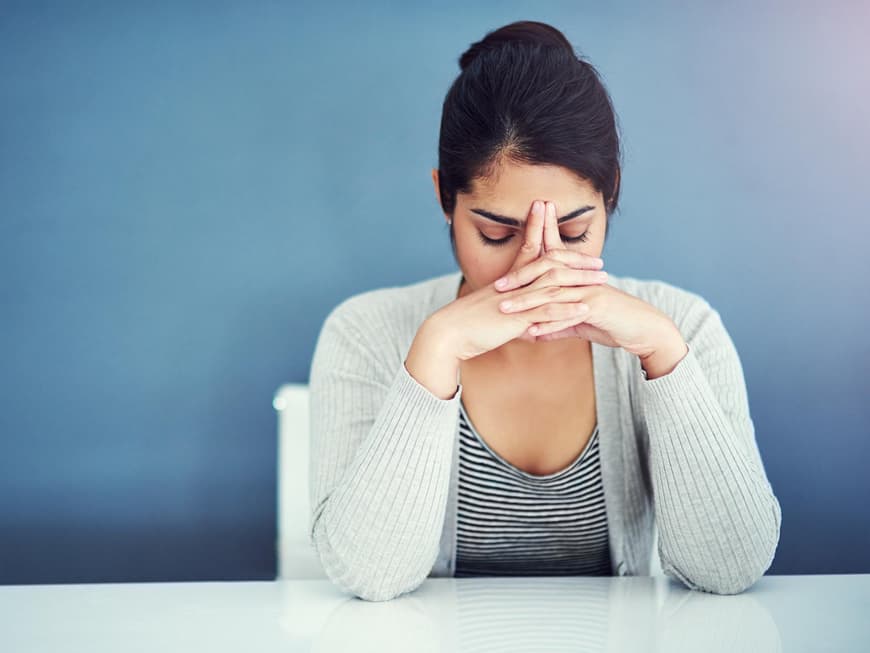
Inner trembling and nervousness? This may be the cause
Constant tension, nervous restlessness and insomnia: those affected by inner tremors often feel driven and restricted in their everyday life. Find out here what the possible causes are and what you can do to combat inner restlessness.
Symptoms: Inner nervousness has many faces
Everyone experiences stressful phases of life. And everyone feels the tension individually. However, one feeling almost always occurs with inner restlessness: the inability to relax properly. Those affected also describe the condition as
- being agitated for no reason,
- constant feeling of being under tension or as a
- feeling that "your nerves are onedge".1
This inner trembling accompanies some sufferers permanently, while others only feel it from time to time. In addition to psychological complaints, physical symptoms such as
- sweating,
- palpitations,
- trembling,
- dizziness,
- light-headedness and
- feelings of weakness
If the nervousness manifests itself as anxiety, breathing difficulties, feelings of anxiety, hot flushes and nausea can also exacerbate the symptoms.
Source: "Inner restlessness: causes, symptoms & treatment". Deutsche-familienversicherung.de, https://www.deutsche-familienversicherung.de/krankenhauszusatzversicherung/ratgeber/artikel/innere-unruhe-ursachen-symptome-therapie/. Accessed September 07, 2022.
From alcohol to diabetes: sources of inner trembling
Sometimes all it takes is a look at everyday life to find the cause of nervousness: Too much coffee, nicotine or alcohol can increase the pulse rate and thus trigger the permanent restlessness. In addition, there are other possible causes, ranging from entertaining life circumstances to serious illnesses.
- Exam nerves or stage fright
- stressful situations such as separations, work-related stress or the death of a loved one
- low blood sugar (hypoglycemia)
- low blood pressure (hypotension)
- Overactive thyroid (hyperthyroidism)
- Personality disorders, psychological problems, depression
- Side effects of certain medications such as flu or asthma medication
- Menopause
Caution: If the nervous restlessness is accompanied by acute shortness of breath, chest pain and coughing, a pulmonary embolism may be the cause. Symptoms such as palpitations, palpitations and feelings of tightness and oppression in the chest, on the other hand, are warning signs of cardiac neurosis.
Diagnosis and treatment for constant nervousness
A state of restlessness can be a symptom of various physical and mental illnesses. Therefore, if in doubt and especially in the case of prolonged nervousness, consult a doctor. During a detailed consultation, the doctor will get a comprehensive picture of the inner trembling. After the doctor has asked the patient about the exact nature and duration of the restlessness and whether they are taking any medication, blood pressure measurements, psychological tests such as a questionnaire to diagnose depression or blood tests can provide information.
The therapy is then aimed at eliminating the original problem: For example, regular exercise and sufficient sleep help against low blood pressure.ii In the case of depression or other mental illnesses, appropriate psychotherapeutic treatment can bring improvement.
Sources:
"Diagnosis of depression". Health portal, https://www.gesundheit.gv.at/krankheiten/psyche/depression/diagnose.html. Accessed September 12, 2022.
"Lowering blood pressure naturally: Six tips for your everyday life". Herzstiftung.de, https://www.herzstiftung.de/ihre-herzgesundheit/gesund-bleiben/bluthochdruck/tipps-zu-blutdruck-natuerlich-senken. Accessed September 12, 2022.
Conquering inner tremors: tips for more serenity
If a serious illness can be ruled out as the cause of nervousness, taking a few minutes to reflect on your situation can sometimes work wonders: Is there anything that is weighing heavily on your psyche right now? And if so, is it still so important in relation to health, family and friends?
There are a number of things that can be actively done to combat inner turmoil.
- Relaxation techniques such as autogenic training, meditation or yoga
- Medicines based on valerian, hops, lemon balm or passion flower
- Physical exercise in any form, for example walking, jogging, swimming or cycling
Sometimes it also helps to draw up a list of priorities: If there are many things on your mind at the same time, it is good to filter and recognize what is important and what can wait.
Home remedies for nervous restlessness
Various treatments and herbal remedies can also be used to combat inner restlessness. Teas, baths and calf compresses, for example, can alleviate persistent nervousness - here it is important to test for yourself what is good for your body.
- Prepare a calming tea: Ingredients such as valerian, passionflower, St. John's wort, lemon balm or lime blossom are ideal here. The teas can be bought at the pharmacy or made yourself: For example, to make your own drink, mix 40 grams of passionflower herb with 20 grams each of valerian root and lemon balm. Pour 250 milliliters of boiling water over 2 teaspoons and leave to infuse for 10 minutes. Finally, pass through a sieve and drink the tea throughout the day.
- Take a warm bath: But make sure that the water temperature is not higher than 38 degrees Celsius. After bathing for 10 to 20 minutes, rest well covered in bed for an hour - although people with circulatory problems should refrain from doing this. Additives such as lavender or hay flower can also support the calming effect.
- Apply a calf compress: The three-layer system is particularly effective here: for the first layer, soak two thin (cotton) cloths in cool tap water, wring them out and wrap one cloth around each calf. The second layer is a dry cloth. Finally, wrap both layers with a warming scarf or terry towel. It is best to apply this while lying down, keep your feet warm and apply three to four times a day for 20 to 30 minutes.
- Buttermilk has also long been known to be an effective remedy for inner tremors, and a large glass of it can be beneficial for body and soul.
Important: If the nervousness persists despite attempts at relaxation and home remedies, a doctor should clarify the cause.
Sources:
"Inner restlessness: causes, symptoms & treatment". Deutsche-familienversicherung.de, https://www.deutsche-familienversicherung.de/krankenhauszusatzversicherung/ratgeber/artikel/innere-unruhe-ursachen-symptome-therapie/. Accessed September 07, 2022.
"Diagnosis of depression". Health portal, https://www.gesundheit.gv.at/krankheiten/psyche/depression/diagnose.html. Accessed September 12, 2022.
"Lowering blood pressure naturally: Six tips for your everyday life". Herzstiftung.de, https://www.herzstiftung.de/ihre-herzgesundheit/gesund-bleiben/bluthochdruck/tipps-zu-blutdruck-natuerlich-senken. Accessed September 12, 2022.







